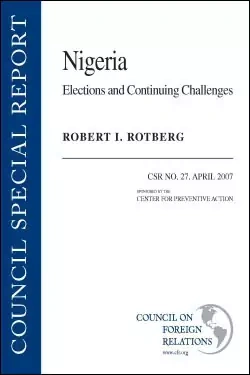
Nigeria
Elections and Continuing Challenges

- Council Special Report
- Concise policy briefs that provide timely responses to developing crises or contributions to current policy dilemmas.
Overview
Nigeria is Africa’s most populous country, the home of sub-Saharan Africa’s largest Muslim population, and one of the world’s leading oil producers.
While Nigeria has the potential to be a successful case study of economic and political reform and religious cooperation, it faces serious problems, including corruption, internal unrest, an HIV/AIDS epidemic, and a struggling economy. Nigeria, the United States, and the international community all have a vested interest in ensuring that the country addresses these challenges and becomes a peaceful, stable democracy. As Robert I. Rotberg details in the latest Council Special Report, a crucial step in this process is for Nigeria to conduct free, fair, and credible gubernatorial and national elections in April 2007.
More on:
Nigeria: Elections and Continuing Challenges, sponsored by the Council’s Center for Preventive Action, suggests immediate and medium-term courses of action for Nigerians and members of the international community. Some of Rotberg’s policy recommendations, such as election monitoring, are focused on helping Nigeria avoid a near-term breakdown of democracy. Others, such as strengthening health care infrastructure and improving security, look more broadly to the future and tackle the country’s fundamental challenges of governance and development. As this report makes clear, the stakes are large: The upcoming elections will dramatically affect this critical country’s prospects—which in turn will dramatically affect the future of all of Africa.
More on:
 Online Store
Online Store
